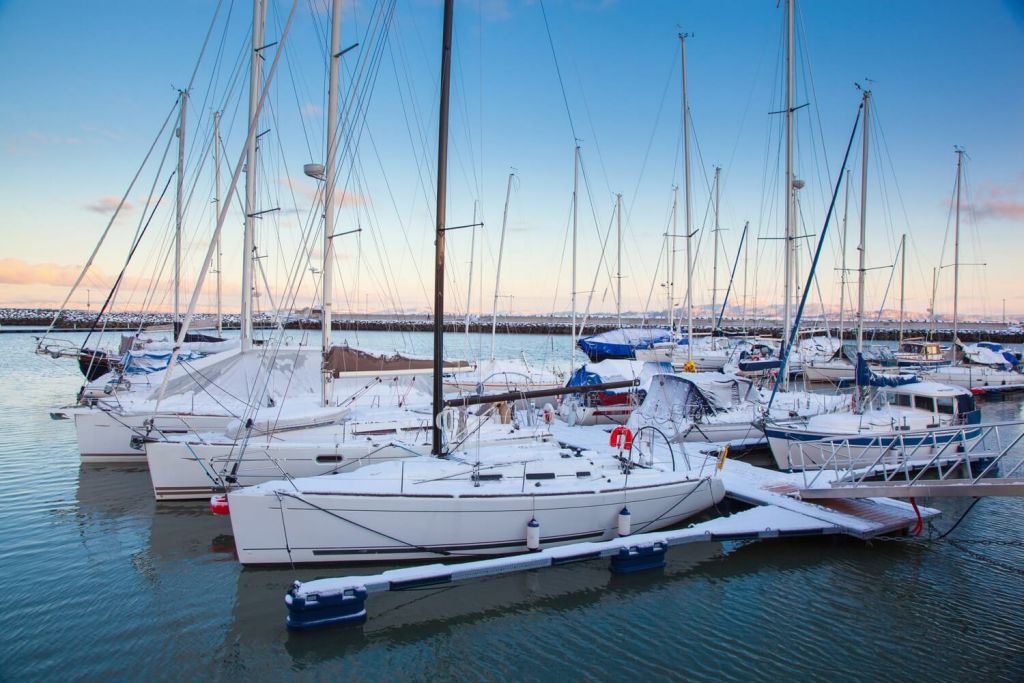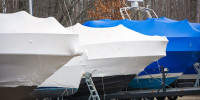The Difference Between Marine vs. Auto Antifreeze
When winterizing your boat, it is important to invest in the right antifreeze. There are some crucial differences between marine antifreeze and auto antifreeze that you need to be aware of before you begin – it’s worth an extra trip to the store!
What is the difference between marine vs auto antifreeze? Marine antifreeze is non-toxic and often contains rust and corrosion inhibitors that protect your engine during the winter. In contrast, auto antifreeze is designed to be used both as antifreeze and coolant for your car engine and can be extremely toxic and environmentally damaging. Car antifreeze should never be used in a boat engine.
With this in mind, let’s take a look at the differences between marine antifreeze and auto antifreeze in more detail, including why these differences matter and the environmental impact of each type of antifreeze.

On this page:
How Does Marine Antifreeze Work Compared to Auto Antifreeze?
Marine antifreeze and auto antifreeze act in a similar way but they are made of different substances. Marine-grade antifreeze gets its helpful properties from propylene glycol, an organic compound that raises the freezing point of water. Propylene glycol contains two alcohol groups and so it is classed as a diol. As well as preventing freezing, most marine antifreeze products also offer rust and corrosion protection for your boat engine.
In contrast, auto antifreeze is usually made from ethylene glycol. Ethylene glycol is another organic compound that lowers the freezing point of water, but it can also be used as a coolant in a car engine. If auto antifreeze is used in a boat engine, it can damage components of your engine and cooling system. It also does not have the same corrosion inhibitive properties of marine antifreeze. The two are not interchangeable and you should avoid using auto antifreeze in your boat engine.
Are There Any Alternatives to Marine Antifreeze?
Whilst marine antifreeze is the best option for winterizing your engine, there are many sailors who also opt for RV antifreeze. Like marine antifreeze, RV antifreeze is made from propylene glycol - though you should always double-check the label to be certain - and is often more readily available than marine antifreeze. It usually costs around $10 for 3 gallons, making it a viable alternative to marine antifreeze.
Once again, there is a big difference between auto antifreeze and RV antifreeze. RV antifreeze is designed to be pumped into the plumbing system of an RV and is therefore non-toxic, like marine antifreeze. In contrast, auto antifreeze is toxic and should not be used in your boat engine.
It is worth noting that some RV antifreeze products contain ethyl alcohol which can cause damage to PVC plumbing hoses. This is something to bear in mind when choosing RV antifreeze for use in your boat.
How to Choose the Right Antifreeze
Most importantly, you want to choose an antifreeze that contains propylene glycol. Look for a product that also has rust and corrosion inhibitors to help provide added protection for your engine. Much of the marine antifreeze you will find at the store contains plant-derived materials and is biodegradable and non-toxic. This makes it safer for you, your family, and aquatic life.
You will need to check the freeze rating of any antifreeze you buy. Even if you’re not expecting particularly low temperatures over the winter, it is worth preparing for the worst-case scenario. If a boat has not been properly winterized, you run the risk of trapped moisture causing corrosion in your engine.
Bear in mind that sometimes the labels lie! An antifreeze labeled for - 50 degrees Fahrenheit can actually begin freezing at about - 5 degrees Fahrenheit. At - 50 degrees and below, you run a serious risk of your antifreeze being a solid block of ice, which can crack your engine blocks.
To be safe, you should look for an antifreeze that has a freezing point well below the temperatures you’re expecting to get in your winter storage location. You’ll also want to use marine antifreeze at full strength. Don’t be tempted to dilute it.
Why Does the Toxicity Matter?
Auto antifreeze is extremely toxic to the environment and marine wildlife if it leaks into the water. Even if you flush your system through and drain it properly, there is still a high chance that antifreeze will leach into the lake or sea where your boat is. The chemicals eventually break down into carbon dioxide and water, both nontoxic byproducts, but the interim substances are highly toxic.
Auto antifreeze is toxic to plants, animals and the environment. In humans, ingestion damages the central nervous system, rapidly spreading to the heart and kidneys. It is fatal if left untreated. Unfortunately, the sweet taste makes it attractive to many animals and even small children. When it leaks into the water, it can also kill aquatic organisms, cause severe malformations and critically damage the local habitat.
When winterizing your boat, you want to choose a non-toxic antifreeze to avoid unnecessary damage to the environment. This is where marine antifreeze comes in. Unlike the ethylene glycol in auto antifreeze, marine antifreeze contains propylene glycol which is non-toxic. Propylene glycol also has no taste, making it less attractive to animals who might be tempted to eat it. It is further used as a solvent for food colors and flavorings so it is much safer for use around children and pets. Nonetheless, you should keep it stored up high and out of reach just to be on the safe side.
Is Marine Antifreeze 100% Safe?
Whilst marine antifreeze is far less toxic than auto antifreeze, it is not completely harmless and should never be drained directly into the water. Used antifreeze will often contain additional substances from your engine that can be harmful to the environment, including heavy metals.
The degradation process of antifreeze in a lake can deplete the oxygen levels in the water. If this happens on a large scale, for instance, if several boats drain their antifreeze directly into the lake, it can deprive aquatic life of the oxygen they need to survive. The dyes used in antifreeze has also been observed to change the color of the water. The best rule of thumb is: if it doesn’t come from the water, it shouldn’t be put in the water.
To prevent unnecessary pollution, you should use a bucket to capture any antifreeze when flushing your engine to prevent it discharging into the water. Many marinas offer antifreeze recycling so you can dispose of your antifreeze properly and avoid contamination of the local environment. Similarly, keep your containers of antifreeze near the center of the boat so any spills are more likely to stay in the boat rather than going overboard.
How to Dispose of Antifreeze Safely
Ideally, your marina will offer antifreeze recycling. This is the easiest and safest way to dispose of used antifreeze. Not every marina provides this service, however, so you may need to look for a recycling location elsewhere in your area. Websites like earth911.org offer information on recycling points in North America and you can search their database using your zip code.
Outside of North America, you can check with your local council or government to find out the procedure for disposing of antifreeze. Some sailors report pouring used antifreeze into a sealable container and taking it to an auto parts store for recycling. If for whatever reason you are forced to use auto antifreeze, it is absolutely imperative that you dispose of it responsibly.
Marine Antifreeze vs Auto Antifreeze
The key difference between auto antifreeze and marine antifreeze is its toxicity. Marine antifreeze is designed for use in boat engines and it is much less harmful if it leaks into the water during drainage. Many marine antifreeze products also include rust and corrosion inhibitors that can prolong the life of your engine. Though some sailors claim to use auto antifreeze for winterizing their boat engine, the responsible choice is non-toxic marine antifreeze. There is very little difference in price but the environmental effects can be vastly different.
Take the time to go to the store and buy the right marine antifreeze product, your engine and the environment will thank you.
Did you find the answer to your specific question?
👍 6 👎 1


Leave a comment